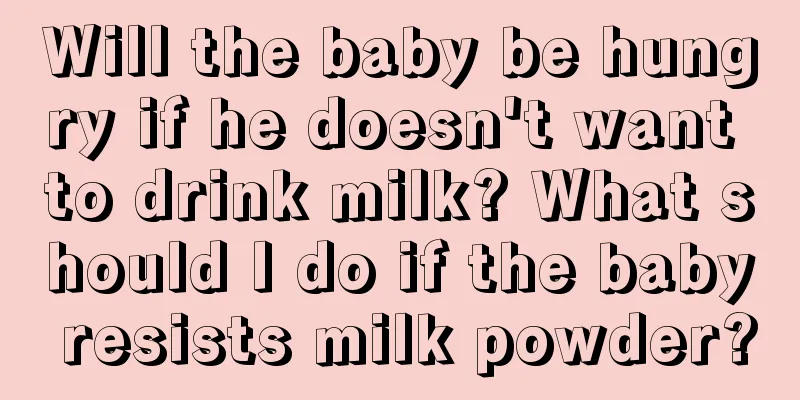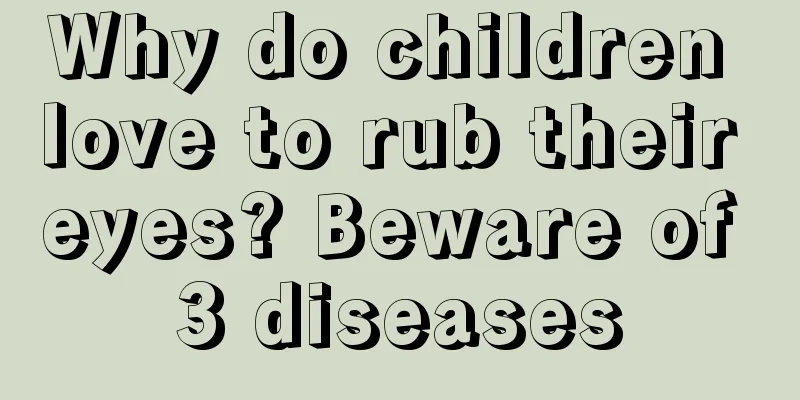Is it okay for a baby to breastfeed while sleeping? What should I do if my baby breastfeeds while sleeping?

|
Some babies like to breastfeed while sleeping, or fall asleep while breastfeeding. Once the mother removes the nipple, the baby will cry. What should I do in this situation? Is it good for babies to breastfeed while sleeping? What should I do if my baby breastfeeds while sleeping? Is it okay for a baby to eat milk while sleeping?In order to make their children fall asleep faster, some mothers like to feed their babies before going to bed, so that the babies can fall asleep while feeding. In fact, this is a wrong practice and has a great impact on the baby. There are mainly the following hazards: First, it can easily lead to otitis media. The human middle ear has a channel connecting the pharynx and the middle ear called the Eustachian tube. The Eustachian tube of infants and young children is shorter and flatter than that of adults, and has a larger cavity diameter. Since children swallow milk while sleeping and lying down, if they swallow in an uncoordinated manner, it is easy for milk to overflow, causing bacteria to breed and cause otitis media. At the same time, the throat area of infants and young children is a place that is particularly prone to dirt and contamination. If milk is retained, it is easy to cause repeated respiratory tract infections in children. Clinical observations show that children with repeated respiratory tract infections often have the habit of feeding before bed. Second, feeding while sleeping can easily irritate the respiratory system and cause inflammation. Children under 2 years old have an underdeveloped digestive system and are prone to gastroesophageal reflux. "Pouring milk" and "spitting up milk", especially feeding while lying down, can easily cause the milk that has entered the stomach to reflux into the esophagus. This is mostly a physiological phenomenon and there is no need to worry. A small amount of milk often does not cause obvious clinical symptoms. However, we often find that some children make a "snoring, snoring" sound in their throats, which is often mistakenly believed to be caused by the sputum of the child's phlegm. The misuse of cough suppressants and expectorants and antibiotics is actually caused by gastroesophageal reflux of milk. Feeding before bedtime aggravates the occurrence of gastroesophageal reflux. Similarly, the retention of milk often causes infection of the respiratory system. At the same time, reflux of gastric juice can stimulate inflammation of the respiratory system. The baby will have a long-term cough that does not heal, and develop a chronic cough, tracheitis, or pneumonia. Third, it is easy to increase the burden on the gastrointestinal tract and cause gastrointestinal diseases. Like adults, babies also need to rest their gastrointestinal tract at night. If they eat milk while sleeping, the milk in the gastrointestinal tract is in urgent need of digestion, and the peristalsis of the gastrointestinal tract and the secretion of digestive juices need to be strengthened. First, the baby's digestive system is not fully developed. Second, when people sleep, the blood supply to the gastrointestinal tract will decrease, which cannot meet the gastrointestinal needs, thereby prolonging the time that milk stays in the gastrointestinal tract, increasing the burden on the gastrointestinal tract, which can easily lead to gastrointestinal diseases and is not conducive to the development of the child's digestive system. Fourth, it is easy to form caries and tooth deformities. Eating milk before going to bed or sleeping with a pacifier (nipple) in the mouth will cause the carbohydrates in the milk to be decomposed by bacteria in the mouth to produce acid, which will corrode the teeth and cause the teeth to decalcify and dissolve. Dentists have shown through research that if food or milk stays in the mouth for more than half an hour, it is easy to cause bacteria to grow and increase the chance of tooth decay. The main reason why babies love to sleep and breastfeedReason 1: Babies love to sleep Generally speaking, the brain of a newborn is not fully developed, so the excitability of nerve cells and the resistance of the cerebral cortex to labor are poor, so it is particularly easy to get tired. This is also the reason why our newborns always sleep longer than ordinary people in daily life. What's interesting is that the baby's sleep time is inversely proportional to the months of its growth, that is, the older the baby is, the shorter his sleep time will be. Newborns, especially those in the first week after birth, usually spend 90% of their time sleeping, so it is not surprising for them to sleep while feeding. Reason 2: Insufficient breast milk There is not enough breast milk, the baby is not full, and is in a hurry to sleep, so naturally he can only sleep while feeding. Reason 3: Sucking is tiring The so-called use of breastfeeding strength, you should know that breastfeeding is also a physical activity. And it is a very happy thing for a baby to snuggle in the arms of his mother during the process of drinking milk. It is easy to fall asleep in such an environment. What to do if your baby falls asleep after feedingWhen feeding, if the baby is about to fall asleep, you can <<gently rub his earlobes or flick his soles with your fingers>> to wake him up and continue feeding. If the baby really doesn't wake up, don't force it, let the baby sleep in the crib, and the baby will wake up soon and you can continue feeding. After four or five times in a row, the baby will sleep for a long time, even for four or five hours, because the baby has been fed several times and the amount of milk he needs has been satisfied. At this time, there is no need to wake him up. The baby will wake up when he is hungry. Although the feeding schedule is disrupted, it will not affect the baby's milk intake. This feeding method is actually "feeding on demand". When the baby is one month old, the situation of sleeping after feeding will gradually change. It is not too late to establish the habit of feeding on time. Constantly stimulate the baby's sucking: When you feel that the baby has stopped sucking, <<gently move the nipple or turn the pacifier>>, the baby will continue sucking. If necessary, you can also <<gently pinch the baby's earlobes or pat the baby's cheeks, flick the soles of the feet>> to give him (her) some awakening stimulation, prolong the excitement time, make the baby get enough milk, and let him (her) have a good sleep only after the baby is full, and cultivate the baby to develop good feeding habits. Precautions for preventing babies from falling asleep after feeding1. The size of the nipple hole should be moderate For some babies who are mixed-fed, their mothers choose to feed them with nipples with very small holes to prevent them from choking on milk. This will cause the baby to spend a lot of effort to eat a little bit of milk, and then fall asleep due to exhaustion "not completing the task", which causes parents to worry, thinking that the baby has a poor appetite. In fact, this is an illusion, so it is important to choose a nipple with the right size hole when feeding. How to determine whether the pacifier size is appropriate (1) When you turn the bottle upside down, the milk will flow out of the nipple hole drop by drop, so the nipple hole is the right size; (2) When the milk flows out in a straight line, the hole is too large; (3) If milk only flows out after shaking vigorously, the hole is too small. For babies with good sucking ability, they can usually suck the amount of milk they need in 10-15 minutes. If they are too tired from breastfeeding, they will naturally refuse. 2. Don’t let the mother fall asleep while breastfeeding When breastfeeding (especially at night), the mother may fall asleep while feeding, and the baby will soon fall asleep with the nipple in his mouth. The baby will lack the constant stimulation of sucking during feeding, and it will be easy for the baby to form a conditioned reflex over time, and fall asleep after just a few sips of milk. Therefore, hard-working mothers must pay attention to feeding techniques. In short, breastfeeding requires a process of learning, familiarity and understanding for both mothers and babies. This process varies from person to person. I believe that every mother can find the most suitable way to feed her baby through learning and exploration. |
<<: How should babies dress in autumn? What should babies wear in autumn?
Recommend
What is Colgate toothpaste like? Which country is Colgate toothpaste a brand of?
Colgate toothpaste has been with us for many year...
What should pregnant women prepare for hospitalization before delivery?
Pregnant women need to be well prepared to be adm...
What is the Chinese name of moony? How to translate the moony brand into Chinese?
Moony is a Japanese maternal and infant brand. To...
How old should you wear diapers? How old should you wear diapers?
Diapers are a must-have product for babies. Today...
Can a one-year-old baby eat shiitake mushrooms? At what age can a baby eat shiitake mushrooms?
Shiitake mushrooms are a type of fungus food, and...
My baby is 15 months old and still can't call me mom. Is this normal?
My baby is 15 months old and still hasn't cal...
What should I do if my baby refuses to brush his teeth and cries when I brush them? How can I help my baby develop the habit of brushing his teeth?
Babies refusing to brush their teeth is a headach...
Can babies eat cantaloupe? Can babies eat cantaloupe?
Can babies eat cantaloupe? Cantaloupe is a fruit ...
Is it better to give birth naturally or by caesarean section? Does Lamaze breathing work?
Natural birth or caesarean section is a choice th...
How to choose a name for a child? What is the best name for a child?
How to choose a name for a child 1. Calculate the ...
What foods are good to eat during pregnancy preparation? What foods can promote ovulation during pregnancy preparation?
Preparing for pregnancy is a process that every c...
Is edema normal during pregnancy? Is edema normal during pregnancy?
Most pregnant women will experience edema during ...
Can I still get pregnant if I have ovulation bleeding?
When it comes to ovulation bleeding, everyone may...
How old is the baby? Can he travel long distances? He will have accurate memory at 4 years old.
You can take your child on a long distance trip w...
What are the symptoms of a baby swallowing a foreign object? What should I do if my baby swallows a foreign object?
Babies are very young and often swallow some food...









